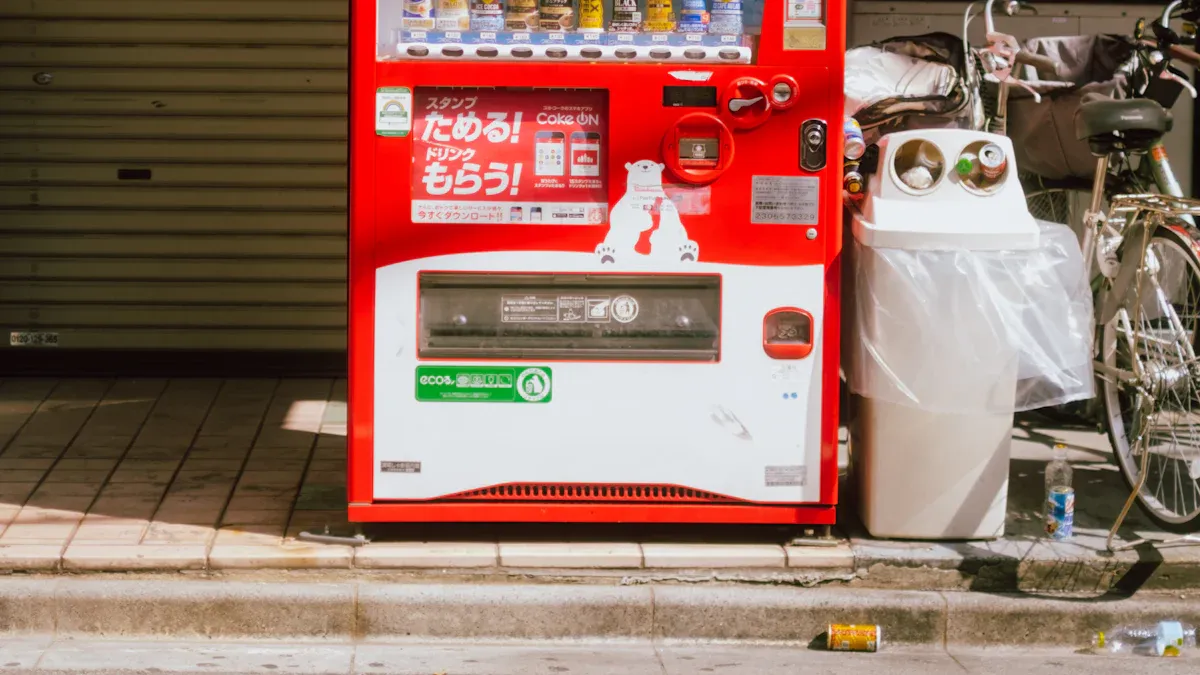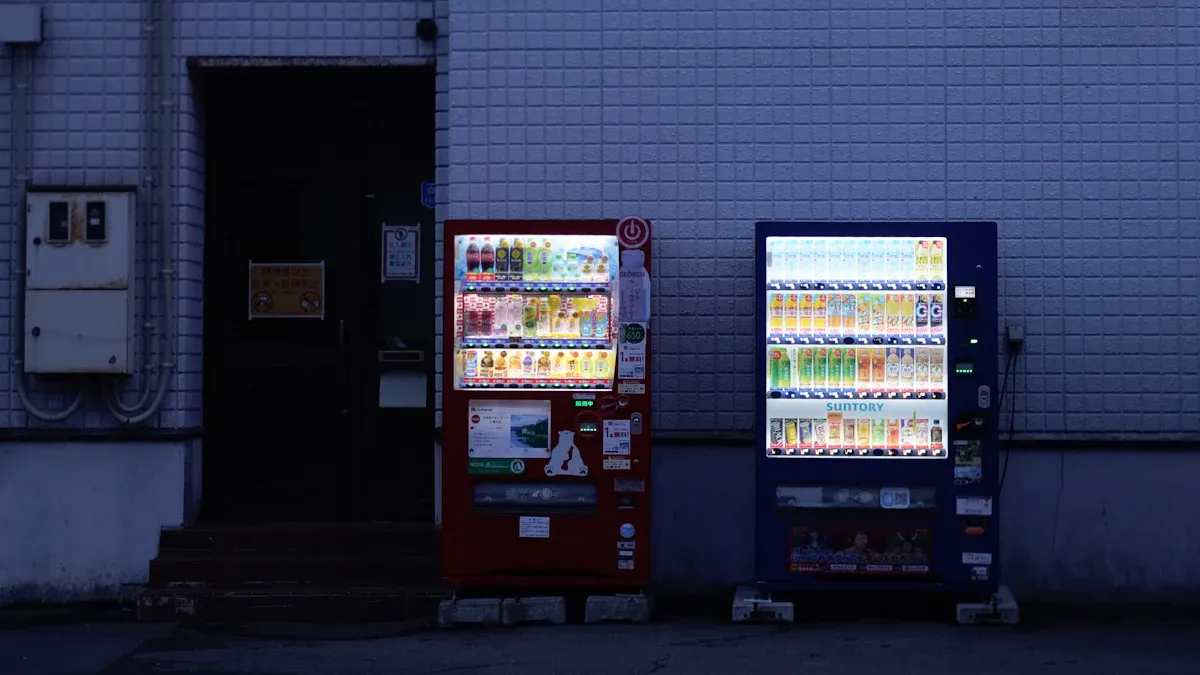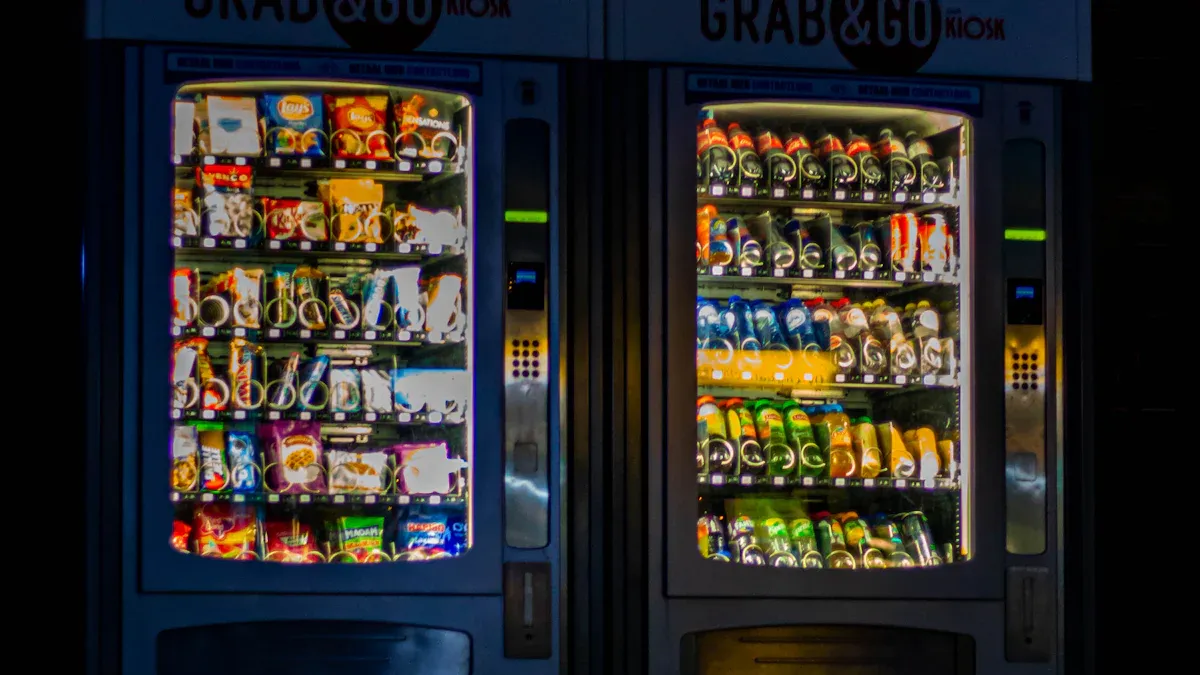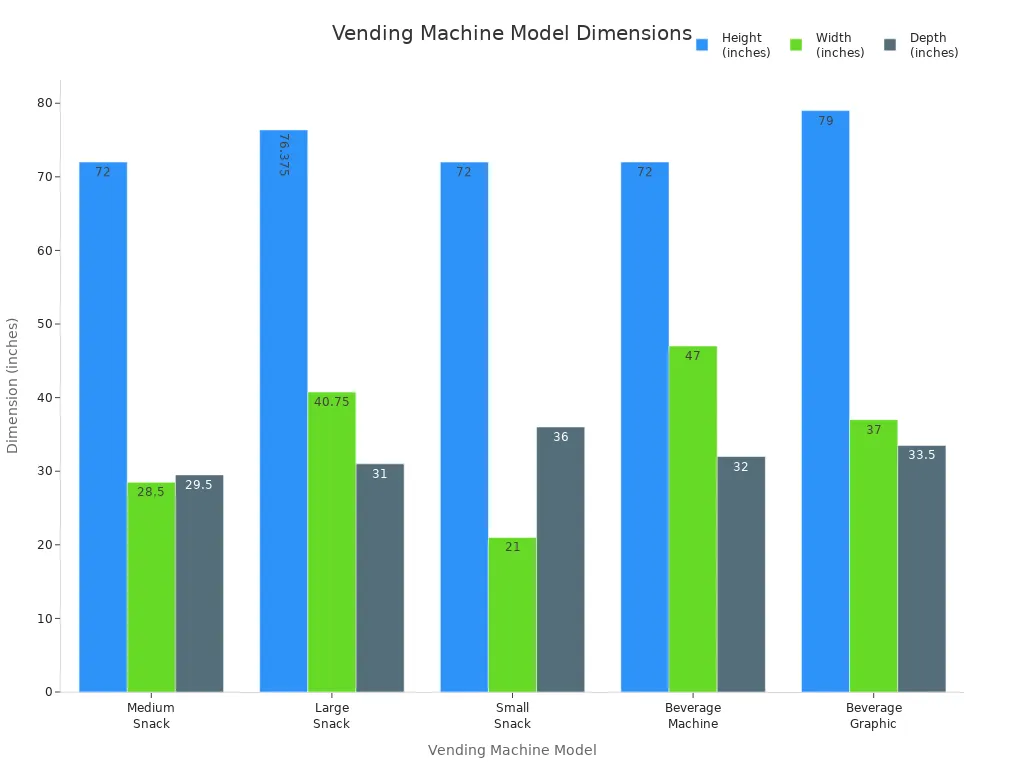Vending Machine Size Variations and Key Dimensions for Snack and Beverage Models

You will find that vending machines come in a range of sizes to fit different locations and needs. For example, popular snack and beverage models often stand about 72 inches tall, with widths from 29 to 41 inches and depths up to 38 inches. The table below shows typical dimensions and capacities for modern vending machines:
Model | Height (in) | Width (in) | Depth (in) | Weight (lbs) | Capacity |
|---|---|---|---|---|---|
72 | 41 | 38 | ~811 | Up to 376 items | |
72 | 32–41 | ~35 | ~805 | Up to 528 snacks + 240 bottles | |
72 | 29.3 | 34.75 | 431 | 316 products |
You should always consider vending machine size because it affects installation, accessibility, and the types of products you can offer.
Key Takeaways
Vending machines come in snack, beverage, and combination types, each with unique sizes and features to fit different needs.
Snack machines vary from compact to large sizes, offering flexible layouts to hold many snack options in various spaces.
Beverage machines need more space due to refrigeration and come in graphic and non-graphic models with different dimensions.
Combination machines save space by offering snacks and drinks together but require careful stock management.
Always measure your space and allow extra room for maintenance and accessibility to ensure the best fit and user experience.
Vending Machine Types
Vending machines come in many forms, each designed for specific products and user needs. You will find that the main types of vending machines include snack, beverage, and food vending machines. These machines differ by the items they offer, the technology they use, and the features they provide. Some machines use simple mechanical systems, while others use advanced electronics and smart features. Payment options range from cash to contactless cards and mobile wallets. You may also see machines with interactive screens or even humanlike designs to make your experience more engaging.
Snack Vending Machines
Snack vending machines give you quick access to a wide range of snacks. You often see these machines in busy places like schools, offices, airports, and malls. The cabinet usually has a glass window so you can view the snacks inside. Inside, you find shelves or compartments that hold chips, candy bars, cookies, nuts, or pretzels. You select your snack using a keypad or touchscreen after making a payment. Many modern snack vending machines show nutrition facts and ingredient lists on their screens. Some even let you choose portion sizes or healthier snack options. Sensors inside help keep snacks fresh and alert operators if there is a problem. These machines make it easy for you to grab snacks quickly and safely.
Beverage Vending Machines
Beverage vending machines let you buy drinks like water, soft drinks, energy drinks, and coffee. You find these machines in both public and private spaces. Many beverage vending machines now use smart technology. This means you can pay with credit cards, mobile wallets, or even Bitcoin. Some machines offer touch-free transactions and cloud-based reporting for operators. Security features like locks and cameras help keep the machines safe. Beverage vending machines help you get your favorite beverages fast and without needing cash. Branding and machine design can also influence which beverages you choose.
Food Vending Machines
Food vending machines give you access to fresh food at any time. You see these machines in places like hospitals, offices, airports, and schools. Many food vending machines use smart technology, such as IoT, to track inventory and offer real-time payments. Some fresh food vending machines let you order through a mobile app and get personalized recommendations. These machines keep food safe with temperature controls and sensors. You can find food vending machines that store hot, cold, or even frozen food at the same time. Features like RFID help reduce food waste and keep track of what is inside. Food vending machines often have touchscreens that show product information and let you choose what you want. Small businesses use fresh food vending machines to sell items like cupcakes or hot meals without extra staff. These machines help you enjoy fresh food, reduce waste, and make food available 24/7.
Tip: When choosing between types of vending machines, think about what products you want to offer and where you plan to place the machine. Each type has unique features to match different needs.
Vending Machine Size

When you choose vending machines, understanding their size and specifications helps you plan for the right fit. Each type of machine—snack, beverage, or combination—has unique dimensions and features. Knowing the average vending machine dimensions makes it easier to select the best model for your space and needs.
Snack Vending Machine Size
Snack vending machines come in several sizes. You can find large, medium, and small models to fit different locations. Here are the typical size ranges:
Large snack vending machines often measure about 76.375 inches tall, 40.75 inches wide, and 31 inches deep. These models work well in busy areas where you want to offer many snacks.
Medium snack vending machines usually stand around 72 inches tall, with widths from 28 to 40 inches and depths between 30 and 36 inches. These sizes fit most offices, schools, and public spaces.
Compact snack vending machines are about 55 inches tall, 28 inches wide, and 25 inches deep. You can use these in smaller rooms or places with limited space.
Size Category | Height (inches) | Width (inches) | Depth (inches) |
|---|---|---|---|
Large | 76.375 | 40.75 | 31 |
Medium (Average) | 39 | 33 | |
Compact (Small) | 55 | 28 | 25 |
Most snack vending machines have adjustable columns or trays. You can change the layout inside the machine to fit different snacks, such as chips, candy bars, or cookies. This flexibility lets you offer a wide range of products. The external vending machine size stays the same, but you can adjust the shelves to hold snacks of many shapes and sizes. Some models, like the OVM-VendRevv S52, include pull-out trays that make loading and servicing easier. You get more product variety without changing the machine’s footprint.
Tip: Adjustable trays help you stock snacks of different sizes, but always check the external vending machine dimensions before installation.
Beverage Vending Machine Size
Beverage vending machines come in several standard sizes. You will see both graphic and non-graphic models. These machines often need more space because they include refrigeration for beverages like water, soda, and energy drinks.
Model Type | Height (in) | Width (in) | Depth (in) | Weight (lbs) |
|---|---|---|---|---|
Non-Graphic Beverage | 72 | 47 | 32 | 765 |
Graphic Beverage | 79 | 37 | 33.5 | 650 |
You can find beverage vending machines in many public places. Some models are compact for smaller spaces, while others are larger to hold more beverages. The size you choose depends on how many drinks you want to offer and the available space. Beverage vending machines often require more installation space than snack machines because of their refrigeration units. Always check the vending machine size and allow extra room for ventilation and maintenance.
Combination Models
Combination vending machines let you offer both snacks and beverages in one unit. These models help you save space and provide more choices for your customers. A popular example is the Seaga SM2300. This machine measures about 69.5 inches tall, 30 inches wide, and 29 inches deep. You get both snack and beverage options in a single footprint.
Combination models balance the needs of snacks and beverages. Here is how they do it:
They combine snacks and beverages in one machine, saving space compared to using two separate machines.
You may notice a smaller inventory for each product type, so you need to manage stock carefully.
These machines work well in places with limited space, such as small offices or waiting rooms.
They include features from both snack and beverage vending machines, like adjustable trays and refrigeration.
Some models, like the Evolution SZ24 and SZ38, offer up to 24 or 38 product selections. You can stock boxes, cans, bottles, and snacks together.
Combination machines often include ADA compliance, LED lighting, and easy-to-use interfaces.
Note: Combination vending machines give you flexibility and variety, but you must balance the size and capacity for both snacks and beverages.
When you compare vending machine size across snack, beverage, and combination models, you see that each type has its own strengths. Snack machines offer flexible product layouts, beverage vending machines provide refrigeration for drinks, and combination models maximize product variety in a single unit. Always review the vending machine dimensions and specifications before making your choice. This ensures you get the right fit for your location and your customers’ needs.
Placement and Selection
Space and Clearance
When you install a vending machine, you must think about more than just its size. You need to meet space requirements for cleaning, maintenance, and safety. For example, you should allow extra room around the machine. If you plan to use an enclosure, increase the space to about 80 inches tall, 45 inches wide, and 40 inches deep. This extra space helps with air flow and makes it easier to move the machine if needed.
Place freestanding machines so you can clean underneath. You can do this by using machines on legs with at least 6 inches of clearance, or by choosing models on rollers.
Make sure all service connections, like water or electricity, are sealed to keep out pests.
Avoid blocking walkways or emergency exits. Always check local safety rules before installation.
Tip: Always measure your available space before choosing a vending machine. This step helps you avoid problems during delivery and setup.
Capacity Needs
Choosing the right vending machine size depends on how many people will use it and how often you can restock it.
Large machines work best in busy places where you cannot refill them often. They hold more products and reduce the number of restocking trips.
Smaller machines fit well in tight spaces or where you can restock every day. They keep snacks and drinks fresh and help you rotate products quickly.
Think about foot traffic. More people means you need a bigger machine with more choices.
Plan for the future. Some machines have adjustable shelves or modular designs, so you can add more products as demand grows.
Factor | Impact on Capacity |
|---|---|
Foot Traffic | Higher traffic needs more capacity |
Restock Rate | Frequent restocking allows smaller machines |
Customer Choice | More variety needs more space inside |
Accessibility
You want everyone to use your vending machine easily. ADA guidelines say that controls should be between 15 and 48 inches from the floor. This range helps people in wheelchairs or with limited reach. Place machines where users can approach them without trouble. Avoid tight corners or spots that cause lines to form in busy areas.
Make sure the machine is visible and easy to reach for both kids and adults.
If your location serves the public, you must follow ADA rules. Sometimes, you can provide help to customers who need it instead of changing the machine.
Leave enough clear floor space in front of the machine for easy access.
Note: Good placement and accessibility make your vending machine more user-friendly and can increase sales.
Comparison Table

Snack vs. Beverage Vending Machines
When you compare snack and beverage vending machines, you notice clear differences in their size and shape. Snack vending machines usually have a height between 68 and 72 inches. Their width ranges from 29 to 41 inches, and their depth is often between 30 and 34 inches. Beverage vending machines, especially the wider models, can reach up to 47 inches in width and 33.5 inches in depth. Both types of vending machines stand at a similar height, but beverage models need more space for cooling units and larger drink containers.
You should remember that larger beverage or multi-product vending machines often take up more floor space than snack machines. This extra width and depth help them store bottles and cans securely.
Here is a quick side-by-side look at the main differences:
Machine Type | Height (inches) | Width (inches) | Depth (inches) |
|---|---|---|---|
Snack Vending Machines | 68 to 72 | 29 to 41 | 30 to 34 |
Classic Snack Machine | 72 | 35 or 39 | 35 |
Beverage Vending Machines (wide) | 72 | 40 or 47 | 33.5 |
Beverage Vending Machines (narrow) | 72 | 31.25 | 36.25 |
Popular Model Dimensions
You can find many popular vending machines on the market today. Each model has its own size and capacity. Medium snack vending machines are a favorite for offices and break rooms because they balance space and product variety. Large snack vending machines work well in busy places, while smaller models fit tight spaces. Beverage vending machines, especially graphic models, stand out with their extra height and width.
Vending Machine Model | Height (in/cm) | Width (in/cm) | Depth (in/cm) | Capacity (items) | Weight (lb/kg) |
|---|---|---|---|---|---|
Medium Snack Vending Machine | 72 / 182.9 | 28.5 / 72.4 | 29.5 / 74.9 | ~312 | 505 / 229 |
Large Snack Vending Machine | 76.375 / 194 | 40.75 / 103.6 | 31 / 79 | N/A | 660 / 300 |
Small Snack Vending Machine | 72 / 182.9 | 21 / 53.3 | 36 / 91.4 | N/A | 370 / 168 |
Beverage Vending Machine | 72 / 182.9 | 47 / 119.4 | 32 / 81.3 | N/A | 765 / 347 |
Beverage Machine - Graphic | 79 / 200.7 | 37 / 94 | 33.5 / 85.1 | N/A | 650 / 295 |

You can use these tables and the chart above to help you choose the right vending machines for your space. Always check the dimensions before you buy or install a new machine. This step ensures you have enough room for both the machine and your customers.
Choosing the Right Vending Machine
Matching Size to Location
You want your vending machines to fit perfectly in their new home. Start by looking at the space you have. Measure the area carefully and check for any obstacles. Think about how many people walk by each day. If you have a small office, a compact machine works best. For busy places like schools or gyms, larger vending machines can handle more customers and offer more choices.
Place machines where people gather, such as lobbies or break rooms.
Make sure the spot is easy to see and reach.
Check that the area is safe and has good lighting.
Tip: A site survey helps you find the best spot for your vending machines and ensures you get the most sales.
Balancing Capacity and Space
You need to balance how much your vending machines can hold with the space you have. Modern machines use smart technology to help you stock the right products. Touchscreens and data tracking show which snacks or drinks sell best. This means you can fill your machine with popular items and avoid wasting space.
Use combination machines if you want to offer both snacks and drinks in one spot.
Analyze sales data to focus on high-demand products.
Plan your restocking schedule to keep the machine full and running smoothly.
A well-placed machine with the right mix of products keeps customers happy and boosts your profits.
Planning for Future Needs
Think about how your needs might change over time. If you expect more people to use your vending machines, choose models that can grow with you. Smart machines let you track sales and adjust your stock quickly. Leasing machines gives you the flexibility to upgrade as your business grows.
Factor | Small Vending Machine | Micro Market Vending |
|---|---|---|
Space Needed | 3-4 sq ft | 100-300 sq ft |
Best For | Low, steady demand | High, growing demand |
Daily Transactions | 75-100 |
Note: Start small and expand as demand increases. Smart planning helps you stay ready for future changes.
Understanding vending machine size and key dimensions helps you choose the best model for your space and needs.
Different screen sizes and machine types affect how much information you can display and how customers interact with your machine.
Matching machine size to your location improves customer satisfaction and boosts sales.
Plan ahead using size data to ensure proper placement, easy access, and a wide product variety.
Use resources like detailed size guides, selection tools, and support services to make smart decisions.
With careful planning, you create a better experience for everyone who uses your vending machine.
FAQ
What is the average size of a snack vending machine?
You usually see snack vending machines that stand about 72 inches tall, 35 to 39 inches wide, and 30 to 35 inches deep. These sizes fit most offices, schools, and public spaces.
How much space should you leave around a vending machine?
You should leave at least 4 to 6 inches of space on each side for airflow and maintenance. If you use an enclosure, increase the space to about 80 inches tall, 45 inches wide, and 40 inches deep.
Can you move a vending machine by yourself?
You should not move a vending machine alone. These machines often weigh over 500 pounds. Always use a team and proper equipment, like a dolly or pallet jack, to move them safely.
Are vending machines ADA compliant?
Many modern vending machines meet ADA guidelines. Controls usually sit between 15 and 48 inches from the floor. You should always check the machine’s specifications to make sure everyone can use it easily.
What is the difference between a snack and a combination vending machine?
Snack machines hold only snacks.
Combination machines offer both snacks and drinks in one unit.
Combination models save space and give more product choices.
Choose the type that matches your location and customer needs.
See Also
Analyzing Key Features That Influence Vending Machine Prices
Space-Efficient Tabletop Snack Vending Machines For Contemporary Areas
Detailed Cost And ROI Insights For Vending Machine Models
